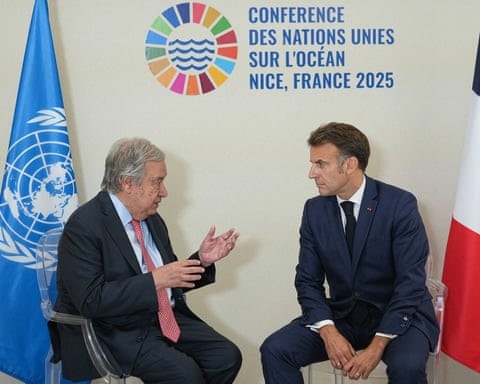A few weeks ago, the city of Nice (France) hosted a meeting that, although it didn't make headlines like other international events, should give us pause for reflection: the United Nations Ocean Conference. In a world increasingly hit by the effects of climate change and the ecological crisis, this summit was an attempt—yet another—to put on the table what we are doing (or failing to do) to the planet's largest ecosystem: our oceans.
The situation is not new, but it is increasingly alarming. The overexploitation of the seas is advancing unabated: industrial fishing, plastic pollution, acidification, biodiversity loss, and now a new threat—perhaps even more silent and dangerous—deep-sea mining. This is a systematic plundering that puts at risk the health of the entire marine ecosystem, on which not only marine life but also human life depends.
During the conference, UN Secretary-General Antonio Guterres delivered a powerful message: the oceans must be protected from plundering to avoid a new global crisis. His words were clear: we cannot allow the deep ocean to become the new "Wild West." This was a direct reference to the deep-sea mining projects already underway in some parts of the world, driven by the promise of resources and wealth, but without real guarantees of sustainability.
It's hard not to share Guterres's alarm. We are talking about virtually unexplored areas of the planet, whose ecological functions we still don't fully understand. Intervening in them without knowing the consequences is, literally, playing with fire in the dark.
As is often the case at these conferences, my feeling as I follow their conclusions is bittersweet. On the one hand, it's comforting to see leaders, scientists, and activists fighting for the common good, demanding environmental justice, and proposing concrete measures to protect the oceans. But on the other hand, it is demoralizing to see that there are countries that continue to act out of pure short-term interest, ignoring not only science but also any basic notion of intergenerational solidarity.

And this is where the great contradiction of our time emerges: if today, with climate change showing its effects day after day—droughts, fires, storms, climate migration—there are still those who deny or minimize the problem, how can we expect them to care about what happens in the invisible depths of the sea?
One of the most shocking data shared during the summit came from the Marine Conservation Institute: less than 3% of the ocean is currently effectively protected from destructive activities. This contrasts starkly with the international goal known as 30x30: to protect 30% of the ocean by 2030.
Today, that goal seems distant. Not because it is technically impossible, but because there is not enough political will. However, there is no alternative. If we want to leave healthy seas for future generations, if we want fisheries, coral reefs, a balanced climate, and a future, we must act now.
Conferences like Nice are not a magic bullet, but they can mark the beginning of a change. They can lay the foundation for binding agreements, foster scientific collaborations, and give a voice to those who truly fight for the oceans.
The important thing is that they don't remain just fine words and empty promises. Because time is running out. And because, as was clearly stated in Nice, what is at stake is not just the oceans, but life as we know it.
Today more than ever, the world needs less national interests and more planetary common sense. Protecting the oceans is not an option: it is a moral obligation and an urgent necessity.
Will we do it ?